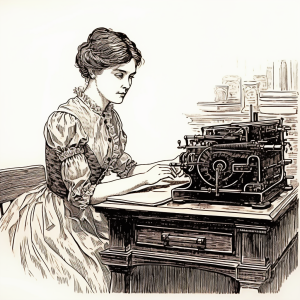CHAPTER VIII.
THE MERITS OF DOMESTIC SERVICE.
WHEN I left Mrs. Brownlow’s I went at once to Camberwell to give up the lodgings I had been supposed to occupy, and to instruct the lodging-house keeper as to what course she was to pursue in case further inquiries were made concerning “Elizabeth Barrows.” I found four letters awaiting me, each one offering me a situation if, after an interview, my appearance and qualifications were satisfactory. But I was obliged to give up all ideas of remaining longer in service, as there was other work requiring my attention. For the next few days I took advantage of every opportunity to interview mistresses and servants, trying to discover the rights and wrongs on both sides of the question. Now, having given much time and thought to the question of domestic service, I am brought to ask myself, “What have I learned by my two weeks spent in service?” I had first become interested in the subject through a conversation with a Camberwell sewing-girl, as I stated in my first chapter, and then I had always contended that domestic work was not in itself degrading, and that there was no reason why the women of the lower classes only should go out to service. I wished to find out for myself if there was anything incompatible between refinement and domestic service, and I went out as a journalist, seeking information, with the intention of giving my personal experiences. I did not start with the idea that all mistresses were tyrants and all servants badly-treated slaves, and I do not set myself up as the champion of the “poor servant-girl.” I am just as much inclined to take the part of the long suffering mistress. In fact, from what I have seen, I have come to the conclusion that there are as many ill-treated mistresses as servants in London. I found Mrs. Allison to be an unjust and unreasonable mistress, demanding more work of her servants than she had any right to expect. With such a large and inconvenient house as hers, she needed to keep at least two strong, healthy housemaids to do the work properly. Had I, in my unfitness for the position, been the only one who had been weighed in the balance and found wanting, I should not thus take occasion to advise her; but Annie, who was a girl accustomed to hard work from her childhood, had been obliged to exchange her place as housemaid for what she thought might be the lighter duties of parlourmaid, and her predecessor had worked herself into the hospital. Remembering this, I feel that I am right in saying that Mrs. Allison is not considerate in her treatment of her servants, neither as regards the work she requires of them nor the kind of food with which she supplies them. I am not now referring to the board wages she allowed, but to the meals which she ordered the cook to prepare for them. A breakfast of bread-and-butter and coffee is not a proper one for a servant. In fact, I do not believe anyone could accomplish satisfactory work on such fare, unless blessed with a very delicate and limited sort of appetite. The noon dinner at Mrs. Allison’s was not so bad. It usually consisted of a joint, potatoes, bread, and pudding, but that was the only good meal her servants were given. For supper they had bread and cheese, day after day and week after week. It is not an excuse for Mrs. Allison to say that thousands of girls would be glad to have bread and cheese all the year round. I am aware that many women are starving in London, but that does not justify a woman in neglecting to look after the wants of those in her employ. Mistresses, hiring servants, promise to pay them a certain wage and board. Shall they give their housemaids a piece of dry bread and say, “Take and eat it, and be thankful; remembering that many girls are very hungry in the East-End and have not even a crust” ?
Mrs. Brownlow, on the other hand, was kind and considerate with her servants. She gave them too much liberty, and thought more of their comfort than of her own well-being. Her house had been fitted up with a view of making the work light and easy of accomplishment, and three servants should have done all the work and had plenty of leisure for rest and recreation. Alice and the cook were most ungrateful and neglectful, and did not in any way endeavour to please. So in the face of all this, it can readily be seen that I have no reason to pose as the defender of the London servant-girls; neither am I prepared to condemn them all, and try to push them out of their situations and fill their places with another class of women.
Still, with this vexing servant problem becoming more and more important every year, it would seem that something should be done to bring about a change. There are many young women now employed as servants who are a disgrace to their trade. They have no capacity for domestic work, and are perfectly devoid of ideas as to the best way of performing their duties. Besides having no reasoning faculties, they have no sense of honour, and seem to be unable to appreciate their unfitness for such service. Just what they would be able to do, and do well, is something I have not discovered, if, indeed, there is any room at all for them on this planet. It may be that they originally had a talent for something; but, if so, it must long ago have been wrapped in a napkin and buried deep down in the earth.
Then there are girls who are eminently fitted for housework—those whose quiet inclinations would lead them to domestic labour as a means of livelihood, except for the foolish idea that in doing so they would demean themselves. So, down in the East-End, in the City, and in every direction of this great London, they are wearing out body and soul with sewing, writing in offices, factory work, and doing other things where the hours are many and the wages small, but prating ever of their “liberty” and “independence.” If they get sufficient food to keep them alive and a mere covering for their bodies, it is all they can ever expect; for they are ordinary, commonplace sort of women, these toilers, and do not look forward to being experts. Many of them would make good cooks and housemaids—some of them have a special talent for just such work—but they do not think of going out to work. Why? Because they must give up their “liberty.” And in what does their present liberty consist ? So far as I can see, it seems to be liberty to starve.
There are young women—daughters of genteel, but poor parents—living at home, a burden to their families, doing nothing to lighten the care of their overworked fathers, sitting idly by the window doing fancy work, perhaps, waiting and watching for what ? —a husband. There do not seem to be enough husbands in England to go around, and to many of these girls the desired deliverer never turns up; they live on their perfectly useless lives, a burden to everyone about them. Why have they not been trained to some sort of work and qualified to take care of themselves? Some of them would make excellent cooks and houseworkers if they had proper training. Perhaps they already know how to perform certain household duties, but to earn money by doing that work for other people they imagine would be degrading.
And now I come to a very important phase of this subject, that of the necessity for thorough training for domestic work. I know that the orthodox belief is that all women are naturally domesticated—that they come into the world expressly to be wives, mothers, and housekeepers—and when an occasional woman seems not to get the opportunity to take such a position, something has gone wrong in the universe, and the laws have all got entangled. From what I know of womankind, I am convinced that many women are in no way fitted for domestic work, and would only be miserable if they attempted it, although their incapacity for household work and management does not necessarily prevent their being excellent wives and mothers. I will admit that many girls do have a special talent for cooking, sweeping, and dusting; but even they need to be drilled and instructed, just as a person who is a natural artist, musician, or writer needs training for the work. It all the domestic arts were taught in private and public schools, an opportunity would be given to aspirants in this line to go on and perfect themselves; while, of course, those whose tastes did not lead them in such direction, should not be obliged to take up the study. The cooking schools that have already been started in London are accomplishing a vast amount of good, but free schools for instruction in every department of household work are much needed. In advocating these schools I do not undervalue home-training. Many young women have ample opportunity to go down into their own mothers’ kitchens and take lessons in domestic economy; but there are hundreds of girls who have no homes and are unable to do this, and it is for them especially that such schools are in demand.
It may be argued that with the influx of a higher class of women into domestic service, all the present servants will be thrown out of employment, and thus, while doing good to some, a great evil will be done to others. This is not likely to be the case, because the demand for good work is much greater than the supply, and there is room for both. Those men and women who insist that a person employed by them must necessarily be beneath them, and constantly show them deference as to a superior order of beings, will doubtless always cling to the present class of servants; and then ladies who are already suited, and have no reason to dismiss their servants, are not likely to make a change. Thus it will be only the bad servants who will find it impossible to secure situations.
Another difficulty that may present itself is that it would be unpleasant for girls of refinement to be thrown in contact with servants of a lower grade in the same household. The only way out of this difficulty would be for every lady to employ only one class of domestic help. I can understand how an educated girl, obliged to work in the companionship of such girls as Annie and Alice,would find her position a most unhappy one. As a journalist out on an adventure, I was interested in studying them, and in that way my association with them was not so unpleasant; but, had I remained a servant at Mrs. Brownlow’s or Mrs. Allison’s, the society of the other servants would have made me utterly miserable, and they would have cared no more for my companionship than I for theirs, as we had little in common. Ladies employing domestic helps would realise this, and so choose the kind of women they wished to have in their houses. I can see nothing in the work itself that would make it distasteful to girls of genteel birth and rearing who have domestic tendencies. In a house properly fitted up with the conveniences and comforts of modern life the work is not drudgery, and I think there is as much demand in this line for education and scientific thought as in the majority of other callings. Now, I am not asking that all London be torn down and rebuilt to make room for a new order of servants. Houses like Mrs. Allison’s might be made convenient by the expenditure of a few pounds in putting in lifts from the basement to the first floor, and fitting the bedrooms with hot- and cold-water pipes, which would do away with the necessity of carrying heavy trays and water-cans up and down the stairs. By doing this, the number of servants required would be reduced to almost half, so that it would be a matter of economy to make these improvements. The method of heating the houses might also be changed with great advantage. The insertion of hot-air furnaces or gas-grates would not entail much expense. There would not only be less work for servants, but a great stride would be made in the matter of cleanliness. It would not be necessary to heat the whole house up to the boiling-point, as Americans are accused of doing. The heat would be more easily regulated than with coal-fires, and, when the change was once made, there would be a large saving in the price of fuel.
In advocating this change in domestic workers, I do not, by any means, announce myself as being in favour of what is now known as the ” lady-help.” All the “lady-helps “I have met have been too much afraid of soiling their hands and hurting their dignity to accomplish good work. Quite recently one applied at my home for a situation, and her first demand was that she should be made a “member of the family.” I explained that such a thing would be impossible, and she showed the greatest amazement when I informed her that on my ” at-home” day she was expected to wait on my visitors, not to chat with them, and when told that she must serve the meals, instead of joining us at the family dinner, her anger knew no bounds. She went off in a huff, saying that she would not be a servant to her inferiors. It is this ridiculous way of looking at things that has created a prejudice against “lady-helps.” Such help is an impossibility in a well ordered house. The educated woman who engages as a domestic must understand that there is no question as to her inferiority or superiority. If she. works for a woman who is far below her socially and intellectually, she may retain her self-respect just the same. Her employer—I would abolish the terms “master” and “mistress “in this connection, as savouring of slavery days does not ask her to become her companion or a member of the family. Such an arrangement might prove very unpleasant on either side. It is simply a business arrangement, a question of employer and employee. In answer to my advertisement for a situation, I received a few letters from women who wished me to be a “daughter “to them; but, as I had not advertised for a mother, I considered such propositions in very bad taste, and felt sure that no intelligent women would have written me such letters. The educated housemaid would be employed for the same purpose as the uneducated one. Her business is to sweep the floor, make the beds, and do other household work, just the same as the other class would do. No, not the same either, for she should do her work better. The educated parlourmaid will not sit down at the family dinner; she is hired to wait at the table. Her employer is under no obligations to invite her to sit in her boudoir or introduce her to her friends. She is paid money for value received. Each must respect the other. That is the whole thing in a nutshell. I believe that if educated women would take up this matter in a proper way great good would come of it, not only to themselves, but to the “working-girls ” of London.
And what shall be done about the cap and apron, the “Yes, ma’am,” and the “No, sir”? If I were in service the matter of cap and apron would be of little importance to me so long as the costume was becoming. I cannot see why exception should be taken to such a very pretty bit of headgear as the ruffled cap. The girl in the cap looks much neater than the one without it, and it seems to be particularly appropriate for domestic work. During my two weeks in service my self-respect did not diminish in the least. Yet I think that if some members of the new order of house and parlourmaids insist on the abolition of the cap, they will find as many ladies who will not make it a question of prime importance. Surely, no one going out as a cook would object to wearing a head covering which is merely indicative of neatness while preparing the food. So far as the apron is concerned, a sensible girl will see at a glance that it is a positively necessary article of apparel, and is no more a “badge” of anything demeaning than is the small silk or white apron often worn by ladies when doing fancy work. As for the ” ma’am” and the “sir,” I think we might dispense with them without much loss, so long as proper respect is shown on both sides. A lady employing a person whom she knew was her social and intellectual equal would naturally expect to make certain changes in little things like this, and the improved kind of service would, I am sure, more than make up for the loss of a “Yes, ma’am.”
What about “followers”? Shall young ladies employed as domestics be obliged to walk on the street or go in the parks in order to meet their friends and sweathearts? Certainly not. They must have the use of a comfortable sitting-room, where they may receive visitors on certain afternoons or evenings, the number of their callers and the length of their stay being kept, of course, within the bounds of reason. The present class of servant-girls have much cause for complaint on this score. To stipulate that a girl shall have no visitors is as unkind as it is unreasonable and dangerous. A young woman servant is quite likely to have friends of both sexes, and it is probable that she is “keeping company.” To compel her future husband to hang over the area-fence whistling for her to come out, or to oblige her to go to the park and sit on the benches in order to have a talk with him, is not only inconsiderate, it is almost indecent. She should be allowed to receive him once a week or once a fortnight in the servant’s hall. It is not difficult to arrange this matter satisfactorily if reason is shown on the part of both employer and employed.
However, taking service as it is at present, I think that the position of a domestic servant with a reasonable mistress and in a conveniently-arranged house is far superior to that of the sewing girl, the factory-girl, or the struggling stenographer and bookkeeper in the City. There are hundreds of places like Mrs. Brownlow’s, where employment can be found for girls who are not receiving the much discussed “living wage,’ and for those girls, surely, domestic work is preferable to their present employment. There are kind, thoughtful, and considerate women in London who would appreciate good servants and pay fair wages for work well done. There are also, I know, hundreds of girls who are especially fitted for rendering this service. I wish they could be brought to view this subject from a philosophical standpoint, and I would use my influence to convince them that all labour, well performed, is elevating, not demeaning; that the woman who bakes a loaf of bread properly, polishes the family plate so that it may be mistaken for a mirror, or scrubs the kitchen table white and clean, giving her heart and best talents to the work, is as worthy of respect and praise as the painter who depicts on canvas the glories of the sunlit landscape, the poet who weaves his thoughts into verse, or the sovereign who reigns on a throne.




